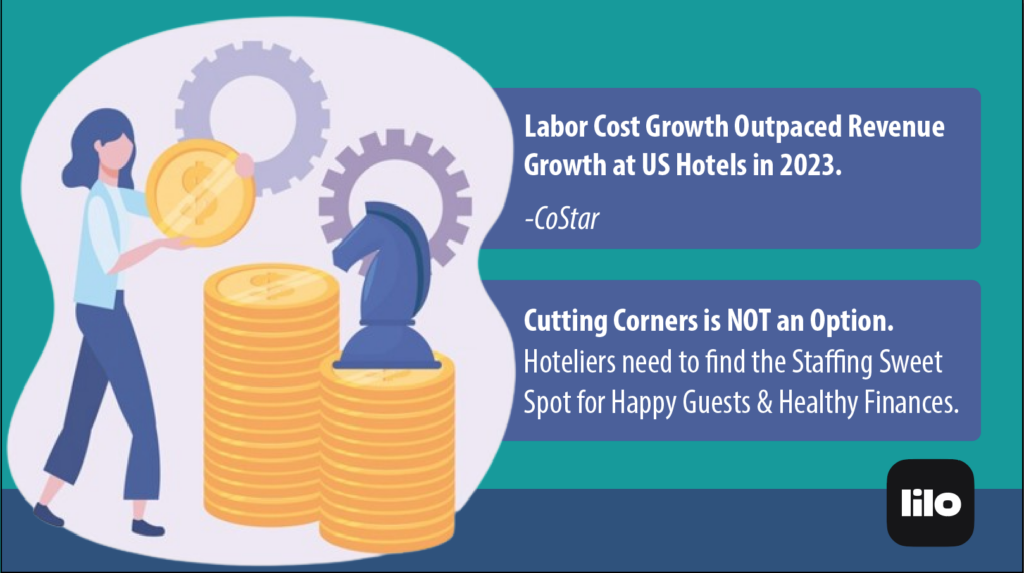Are you a hotel GM eager to cut down on expenses? Reducing your outgoings can seem like an uphill task.
Pick the wrong areas to cut costs and the quality of guest service can take a hit, meaning, your brand reputation will suffer.
Knowing where you should allocate funds and where you should cut back, can directly impact your bottom line.
For many boutique hotels on a shoestring budget, this distinction can mean the difference between profitability and losses.
Saving on Hotel Labor Costs: Do’s and Don’ts
Labor is often a hotel’s biggest expense.
According to CoStar, the year-on-year LPAR (labor cost per available room) growth of 8.6% outpaced the 3% growth in TRevPAR (total revenue per available room) in 2023.
No wonder, hoteliers are always keen to reduce labor costs.

While some adjustments may be necessary, hotel GMs need to ensure that when certain services are provided, they meet or exceed guest expectations.
Guests expect a consistent level of excellence, regardless of fluctuations in availability.
Do’s
Tailor your staffing levels to match the demand fluctuations throughout the day and across seasons.
Utilize hourly employees for peak hours and consider offering “pick-up shifts” to maintain a readily available pool of talent.
Essential hotel services can’t rely on the availability of one person. So, hotels must invest in cross-training programs.
Don’ts
Avoid the temptation to under staff your hotel to reduce labor costs.
You don’t want your staff to be overstretched; this can quickly result in chaos and frustration.
Saving on Hotel Supplies: Do’s and Don’ts
Keeping your hotel well-stocked is a must. But, it’s easy to overspend on supplies.
Do’s
From guest essentials to amenities, consolidate hotel purchases to unlock wholesale rates on hotel supplies, prevent stockouts, and streamline inventory management.
Invest in quality amenities to wow guests.
Team up with a cutting-edge hospitality procurement platform like Lilo to save big on hotel supplies without sacrificing quality.
Don’ts
Do not sacrifice quality for the sake of cutting costs. Choosing price over value when evaluating hotel suppliers can backfire.
Avoid overstocking to qualify for discount hotel supplies; excess inventory will tie up capital, increase storage costs, and encourage theft and spoilage.
Saving on Utilities: Do’s and Don’ts for Hoteliers
Keeping your hotel comfortable for guests is essential, but so is keeping your utility bills under control.

According to Energy Star, US hotels spend up to $2,200 per available room each year on energy. This accounts for 6% of hotels’ net operating costs.
Do’s
Invest in motion-sensor lighting and thermostats to save on utilities.
Occupancy sensors on lighting & HVAC systems can help you accrue significant energy savings.
Don’ts
Avoid leaving HVAC systems solely in the hands of guests just because you don’t want to invest in automated temperature control systems.
Do not leave temperature control to chance. While motion-sensor thermostats are ideal, even a basic solution is better than none.
If advanced tech isn’t within your budget, you can strategically place thermostats away from guest reach.
This helps prevent rooms from turning excessively hot or cold during guest absences, which can lead to discomfort and wasted energy when they adjust the temperature upon arrival.
Saving on Marketing: Do’s and Don’ts
Marketing isn’t something that hotels can afford to scale down, even when they are on a tight budget. How else can you attract guests and drive bookings?
Do’s
Assess which channels or methods are working for your hotel and plan your budget accordingly.
Identify your ideal guest profile and tailor your marketing messages accordingly.
Don’ts
Don’t waste resources on generic advertising campaigns.
Utilize targeted marketing campaigns with demographics and location filters to reach the most relevant audience.
Saving on Routine Processes: Do’s and Don’ts
Hoteliers need to shell out some money upfront to automate routine tasks, but in most cases, it’s well worth it.
Do’s
From guest reservation reminders and guest check-ins to housekeeping and procurement, identify repetitive tasks that can be automated to save time, effort, and money.
Don’ts
Avoid holding back on automation due to concerns about staff adaptability or perceived costs. Don’t let outdated processes hold your property back from realizing its full potential.


